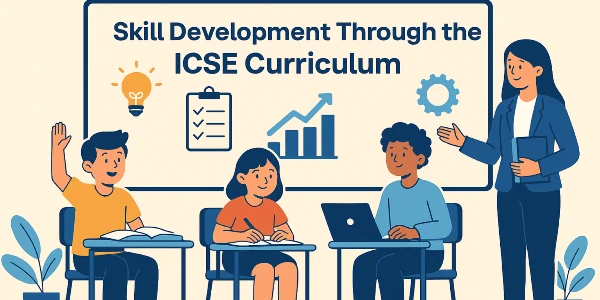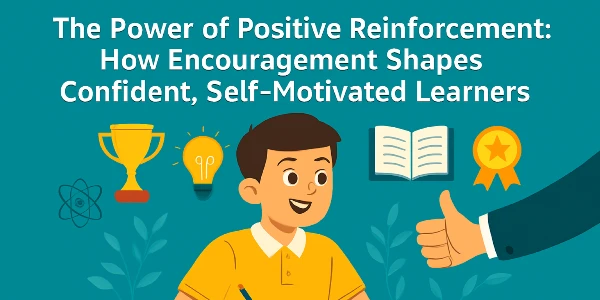
Skill Development Through the ICSE Curriculum: Preparing Students for Life Beyond the Classroom
Education today is no longer confined to textbooks or exam results. It’s about shaping students into adaptable, thoughtful, and confident individuals who can apply what they learn in real life. The foundation of true learning lies not in memorization but in mastering the skills that prepare young minds for the challenges of tomorrow.
Among modern education systems, the ICSE curriculum stands out for its emphasis on skill development, creativity, and real-world application. It encourages children to explore, analyze, question, and communicate — turning learners into innovators, problem-solvers, and leaders.
Education for Life, Not Just for Grades
The world students are stepping into demands much more than academic excellence. Success today depends on communication, teamwork, critical thinking, and emotional intelligence — qualities that can’t be measured by marks alone.
The ICSE curriculum was designed to bring out these skills in every child. Its structure combines academics, co-curricular activities, and values-based learning, creating an environment where students grow holistically. It transforms education from a process of memorization to one of exploration.
When children are encouraged to connect what they learn with real-world experiences, they gain confidence, independence, and curiosity — traits that help them succeed beyond school walls.
How the ICSE Curriculum Encourages Skill Development
The ICSE education system integrates skill-building at every stage. Whether it’s a project in science, a poem in English, or a community activity, each experience helps develop practical, emotional, and intellectual skills that last a lifetime.
1. Critical Thinking and Application-Based Learning
ICSE lessons go beyond repetition. Students are encouraged to question, reason, and apply concepts to real-life scenarios. For instance, rather than just reading about ecosystems, they might create models, observe nature, or present findings through research. This process develops analytical thinking and a love for inquiry.
2. Communication and Collaboration
The ICSE curriculum places strong emphasis on communication. Group discussions, debates, and drama activities are regular features of classroom life. These experiences teach students how to express themselves clearly, listen actively, and collaborate effectively — essential skills for both professional and personal growth.
3. Creativity and Innovation
Creativity is a cornerstone of ICSE learning. Students are encouraged to think independently and find innovative solutions. Art, music, literature, and design are not treated as side subjects but as powerful mediums that enhance imagination and originality. Every creative task builds the confidence to take risks and think differently.
4. Digital Literacy and Technological Skills
In today’s digital era, technology is part of every learning journey. ICSE integrates technology through computer applications, coding activities, and interactive lessons that help students develop digital fluency. They learn to use technology responsibly and productively — a skill that is essential in a rapidly evolving world.
5. Problem-Solving and Decision-Making
Real-life problem-solving forms the heart of ICSE assessments. Students are often given case studies, experiments, and challenges that require logic and creativity. Learning to evaluate options, make decisions, and reflect on outcomes strengthens both intelligence and integrity.
6. Leadership and Teamwork
Skill development in ICSE is not limited to academics. Sports, house activities, and cultural programs teach students leadership, discipline, and cooperation. They learn that success comes not from competing with others but from bringing out the best in themselves and their teams.
7. Emotional Intelligence and Values-Based Learning
ICSE gives equal importance to emotional and ethical development. Through discussions, social studies, and moral education, children learn empathy, kindness, and responsibility. They understand that strong values are the foundation of strong character.
Bringing ICSE Learning to Life at Johnson Grammar School, Hyderabad
The strength of any curriculum lies in how it’s implemented. At Johnson Grammar School, Hyderabad, education is designed to engage, inspire, and empower. Every lesson is a chance to connect classroom learning with the real world.
Teachers at JGS focus on application-driven teaching — turning theory into experience. Science is taught through experiments, mathematics through puzzles, and language through expression and storytelling. Students participate in hands-on projects that sharpen observation, creativity, and critical thinking.
Technology and art blend seamlessly into learning at JGS. Whether through robotics, digital design, or performing arts, children discover how innovation and imagination work together. The goal is to make learning both meaningful and enjoyable, so every student feels confident exploring their potential.
Skills That Last a Lifetime
The outcomes of this approach are evident in how students carry themselves. They grow into articulate communicators, responsible leaders, and compassionate individuals. The skills they develop — problem-solving, collaboration, resilience, and adaptability — stay with them far beyond graduation.
Many JGS alumni share that their ICSE foundation helped them excel in higher education and careers worldwide. What set them apart was not just knowledge, but their ability to apply it confidently, think independently, and lead with empathy.
The Role of Parents in Skill Development
Parents play a crucial role in nurturing these skills outside the classroom. When home and school work together, learning becomes a lifelong habit. Simple practices can make a big difference:
Encourage curiosity through conversations and open-ended questions.
Appreciate effort more than results.
Create time for hobbies and outdoor play.
Let children make small decisions and learn from experience.
Limit distractions to help them focus on creative, mindful activities.
At Johnson Grammar School, Hyderabad, teachers work closely with families to ensure that every child’s learning journey is consistent, supported, and growth-oriented.
ICSE Education: Building a Future-Ready Generation
The future belongs to those who can adapt, think critically, and communicate effectively. The ICSE curriculum builds these abilities naturally — preparing students not just for exams but for the demands of higher education, workplaces, and life itself.
In Hyderabad, ICSE schools have become the preferred choice for parents who want holistic development. The balance of academics, creativity, and life skills makes ICSE education a foundation for future success.
At Johnson Grammar School, Hyderabad, every classroom is a space where curiosity turns into confidence and knowledge transforms into capability. We believe that when learning is rooted in skills, children not only succeed — they shine.
Conclusion
True education doesn’t end with a report card; it begins when students can think, act, and contribute independently. The ICSE curriculum achieves this by nurturing every dimension of a child’s personality — academic, creative, emotional, and social.
At Johnson Grammar School, Hyderabad, this philosophy comes to life daily. Through innovation, mentorship, and meaningful engagement, we prepare students for a world that values ideas, integrity, and initiative.
Because in the end, it’s not just what children learn that defines their future — it’s what they can do with that learning that truly makes them successful.





